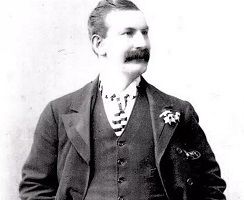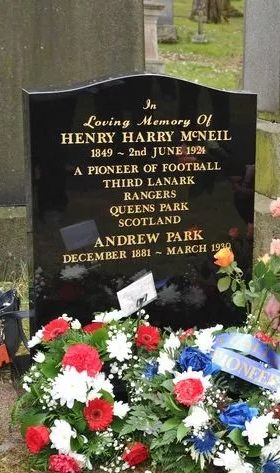Henry McNeil

As the eldest of the McNeil brothers, or at least the footballing ones, Henry "Harry" was the probably the first to make his way from Gareloch to Glasgow, he to work as a Clerk. It meant that, although in early 1871 he was living with his elder sister, Elizabeth, and younger brothers, James, William and joint-founder in 1872 of Rangers, Peter, he was already involved with the game. Said to be a natural sportsman, an athlete, shinty-player and later a coach, he seems to have started with ad-hoc football on Glasgow Green, from where a club south of the river was a natural progression. In his case it was initially 3rd Lanark but by the time his brothers had the idea to form The Gers his loyalties had been transferred to Queen's Park. And there they would remain during his playing-career and beyond.
Harry McNeil, his father a gardener, had been born in 1850 at the family home in Shandon by today's Faslane. So was already twenty-two when the touch-paper of Scottish football was lit in 1872. He was therefore a deal older than many of his then footballing contemporaries and a combination of natural ability and his maturity soon brought him to the fore. A forward, who developed a reputation for his astute passing, he was in the team that won the first Scottish Cup Final in 1874. And he was there again the following year and the one after that. Meantime still in 1874 he had won his cap, in Scotland's first international win and he had married. His bride was Glasgow-girl, Mary Cribbes. They were to have two children, a boy and a girl.
Harry would continue to turn out for Queen's Park until 1884, so almost thirty-four years of age. He had won a third Scottish Cup in 1880 and his last cap in 1881, when he might also have won a fifth cup but for injury. He had also go into business with his brother Peter in 1881 both officially recorded as Glovers and Hosiers with premises in the the city centre but in reality perhaps de facto the first Sports Outfitters.

However, events took a turn in 1889 with the death of his wife in Rutherglen, upon which he rapidly remarried, to Mary Walker, left the business, was recorded in 1891 as living with the in-laws, still in Rutherglen, a travelling salesman, then moving with Mary to Northern Ireland, there to run a hotel in Bangor. Meanwhile the outfitters had gone rapidly downhill, disappearing by 1896, by when for Henry personal tragedy had struck for a second time. Mary would pass away at their hotel in 1895 with the result that he returned to Scotland and Rutherglen once more. In fact he was to live out the last thirty years of his life there, staying with family, working as a sometime florist, sometime wine salesman. That is until his own death at the age of seventy-four and his burial in Rutherglen Cemetery.
Birth Locator:
1850 - "Belmore", Shandon, Garelochhead, Dunbartonshire
Residence Locations:
1851 - Belmore Gardeners' House, Shandon, Garelochhead, Dunbartonshire
1861 - "Belmore", Garelochhead, Argyll/Dunbartonshire
1871 - 17, Cleveland St., Kelvin, Glasgow
1874-6 - 32, MacLean St., Govan, Glasgow
1881 - 144, Berkeley St., Kelvin, Glasgow
1889 - 167, Cathcart Rd,. Hutchesontown/Rutherglen, Glasgow
1891 - 17, Westmuir Pl., Rutherglen, Lanarkshire
1895 - Royal Hotel, Bangor, Northern Ireland
1901 - 31, Greenhill Rd., Rutherglen, Lanarkshire
1911- 33, Stonelaw St., Rutherglen, Lanarkshire
1921-24 - "Siluko", 51, Buchanan Dr., Rutherglen, Lanarkshire
Death Locator:
1924 - "Siluko", 51, Buchanan Dr., Rutherglen, Lanarkshire
Burial Locator:
Rutherglen Cemetery, Lanarkshire
Back to Gareloch and Rhu,
or the SFHG Home page